How to Help Your 5th Grade Student Prepare for the Michigan M-STEP Math Test

Welcome, Michigan parents! As your 5th grade student prepares for the Michigan M-STEP (Michigan Student Test of Educational Progress) math test, you play a crucial role in supporting their success. Understanding the test, key math skills, and effective study strategies are essential to help your child excel. This comprehensive guide will equip you with practical tips, actionable advice, and encouragement to navigate the M-STEP journey with confidence. For official information Michigan Department of Education website.
Understanding the Michigan M-STEP 5th Grade Math Test
The M-STEP assesses students’ math proficiency and problem-solving skills in various domains. For 5th graders, the test covers operations, geometry, measurement, data, and more. It consists of a set number of questions with specific time limits and diverse question types. Understanding the scoring system and proficiency levels is crucial for interpreting your child’s results. The test is typically administered during a specific period, and the results are used to evaluate student performance and inform educational decisions. For additional educational resources,.
Key Math Skills Your 5th Grader Needs to Master
Operations & Algebraic Thinking
In this domain, students work on understanding and applying mathematical operations, solving word problems, and interpreting patterns. For example, your child may need to analyze number patterns and express them algebraically.
Number & Operations in Base Ten
5th graders focus on place value concepts, decimal operations, and multi-digit arithmetic. Helping your child master these skills ensures a strong foundation in numerical understanding and operations.
Number & Operations – Fractions
Understanding fractions is essential for 5th grade math success. Concepts like adding, subtracting, multiplying, and dividing fractions, as well as comparing and converting fractions, are key skills to practice with your child.
Measurement & Data
Measurement involves converting units, solving real-world problems, and interpreting data. Practical activities like measuring ingredients while cooking or reading graphs together can enhance your child’s skills in this area.
Geometry
Geometry concepts in 5th grade cover shapes, angles, area, and perimeter. Engage your child in hands-on activities like building geometric shapes using manipulatives to reinforce their understanding of geometric principles.
Building Strong Math Foundations at Home
Support your child’s math skills development through consistent practice and interactive learning experiences. Incorporate math into daily routines, engage in math-themed games, utilize manipulatives, explore math literature, and leverage technology resources to enhance your child’s math proficiency.
Daily Practice Strategies
- Set aside dedicated time each day for math practice.
- Use a mix of worksheets, online resources, and hands-on activities.
- Encourage your child to explain their problem-solving process aloud.
Making Math Part of Everyday Activities
Integrate math into daily tasks like grocery shopping, cooking, budgeting, and measuring ingredients. Provide real-world examples to demonstrate the relevance of math in everyday life.
Games and Activities that Build Number Sense
Explore math games, puzzles, and challenges that enhance your child’s number sense and problem-solving skills. Games like Sudoku, math board games, and online math quizzes can make learning engaging and fun.
Using Manipulatives and Visual Aids
Manipulatives like base-10 blocks, fraction tiles, and geometric shapes help concretize abstract math concepts. Visual aids provide a tangible representation of mathematical ideas, making learning more hands-on and interactive.
Reading Math Books Together
Explore math-themed literature that introduces mathematical concepts in a narrative format. Reading math books together fosters a love for math and promotes mathematical discussions between you and your child.
Technology Resources that Help
Utilize educational math apps, websites, and online platforms that offer interactive math lessons, practice problems, and educational games. These resources can supplement your child’s learning and provide additional practice opportunities.
Effective Study and Practice Strategies
Help your child develop effective study habits and practice strategies to optimize their learning experience and retention of math concepts. Creating a structured study schedule, engaging in enjoyable practice sessions, and utilizing practice tests are key components of successful math preparation.
Creating a Realistic Study Schedule
- Allocate specific time slots for math practice each day.
- Vary the types of activities to keep the practice sessions engaging.
- Include short breaks to maintain focus and productivity.
Making Practice Sessions Enjoyable and Engaging
Incorporate gamified learning experiences, collaborative problem-solving activities, and interactive math challenges to make practice sessions enjoyable for your child. Positive reinforcement and rewards can also motivate sustained engagement.
Using Practice Tests Effectively
Introduce your child to practice tests to familiarize them with the test format and types of questions they may encounter. Reviewing practice test results together and identifying areas for improvement can guide targeted study efforts.
Reviewing Mistakes Constructively
Encourage your child to analyze their mistakes, understand the underlying concepts, and learn from them. Mistakes are valuable learning opportunities that can lead to deeper understanding and improved performance.
Building Stamina for Longer Practice Sessions
Gradually increase the duration of practice sessions to help your child build endurance for sustained focus and concentration. Break longer sessions into manageable segments to prevent mental fatigue.
Tracking Progress Over Time
Maintain a record of your child’s progress by tracking their performance on practice tests, quizzes, and math assignments. Celebrate improvements and milestones to boost your child’s confidence and motivation.
Test-Taking Strategies and Techniques
Equip your child with effective test-taking strategies to navigate the M-STEP math test with confidence and composure. Time management, careful reading of word problems, strategic problem-solving approaches, and effective error-checking techniques are essential skills for test success.
Time Management Strategies
Teach your child to allocate time wisely among different sections of the test, pacing themselves to complete all questions within the given time frame. Encourage them to prioritize easier questions first and manage their time effectively.
How to Read Word Problems Carefully
Guide your child through a step-by-step process of dissecting word problems, identifying key information, and formulating a plan to solve the problem. Emphasize the importance of understanding the question before attempting an answer.
Problem-Solving Strategies
Encourage your child to explore multiple problem-solving approaches, such as drawing diagrams, using manipulatives, or working backward from the solution. Practice different strategies to develop flexibility in tackling diverse math problems.
When and How to Skip Difficult Questions
Instruct your child on strategic question-skipping techniques for challenging problems that may consume excessive time. Advise them to mark skipped questions for later review if time permits after completing easier questions.
Checking Work Effectively
Teach your child the importance of reviewing their answers systematically to catch errors, verify calculations, and ensure accuracy. Developing a habit of double-checking work can prevent careless mistakes and improve overall performance.
Handling Different Question Types
Familiarize your child with various question formats, such as multiple-choice, free-response, and problem-solving questions. Practice different question types to build proficiency in interpreting and responding to diverse math problems.
Supporting Your Child Emotionally
Emotional support is crucial in helping your child navigate the challenges of test preparation and performance. Recognizing and managing test anxiety, fostering confidence through incremental progress, creating a positive learning environment, and celebrating achievements are essential strategies to support your child’s emotional well-being.
Recognizing and Managing Test Anxiety
Provide your child with coping mechanisms to address test anxiety, such as deep breathing exercises, positive affirmations, and visualization techniques. Encourage open communication about their feelings and offer reassurance and support.
Building Confidence through Small Wins
Recognize and celebrate your child’s incremental successes and improvements throughout their math preparation journey. Encourage a growth mindset and emphasize the importance of effort and perseverance in achieving goals.
Creating a Positive Learning Environment at Home
Foster a supportive and encouraging atmosphere at home that promotes curiosity, exploration, and a love for learning. Establish a designated study space, provide resources for independent learning, and engage in collaborative math activities to reinforce positive associations with math.
Dealing with Setbacks Constructively
Help your child navigate setbacks or disappointing results with resilience and optimism. Encourage them to view setbacks as learning opportunities, identify areas for improvement, and approach challenges with a growth mindset.
Celebrating Progress, Not Just Perfection
Acknowledge and celebrate your child’s efforts, progress, and achievements, regardless of the outcome. Emphasize the value of continuous improvement and the journey of growth and learning rather than focusing solely on final results.
Encouragement Strategies that Work
Offer consistent encouragement, praise, and support to motivate your child throughout their math preparation. Recognize their hard work, perseverance, and dedication, and instill a sense of confidence and self-belief in their abilities.
Practice Resources and Tools
Explore a variety of practice resources and tools that can enhance your child’s math skills and reinforce key concepts tested on the M-STEP. Utilize practice materials, online resources, educational apps, and collaborative tools to support your child’s learning journey.
Review of Helpful Practice Materials
Discover a range of practice materials, including worksheets, practice tests, online exercises, and instructional resources that align with the 5th grade math curriculum. Select materials that cater to your child’s learning style and address their specific needs.
Natural, Helpful Mention of the Comprehensive Practice Book
Consider utilizing the “5 Michigan M-STEP Grade 5 Math Practice Tests” book, designed to provide targeted practice for the M-STEP math test. This comprehensive resource aligns with the test format and content to help your child prepare effectively.
Online Resources and Apps
Explore online math resources and educational apps that offer interactive math lessons, practice problems, and engaging activities. Look for platforms that provide immediate feedback, personalized learning experiences, and adaptive practice opportunities.
How to Choose Quality Practice Materials
When selecting practice materials, prioritize resources that align with the 5th grade math curriculum, offer diverse question types, and provide detailed explanations for correct answers. Choose materials that challenge your child while supporting their skill development.
Creating Your Own Practice Problems
Enhance your child’s math proficiency by developing customized practice problems based on their strengths and areas for improvement. Tailor practice exercises to reinforce specific concepts and provide targeted practice opportunities.
Working with Teachers and School Resources
Collaborate with your child’s teachers to access additional resources, practice materials, and academic support. Stay informed about school initiatives, supplementary programs, and enrichment opportunities that can further enhance your child’s math skills.
Creating a Test Day Success Plan
Recommended Math Resources
Prepare your child for test day success by establishing a structured plan that includes pre-test strategies, test day routines, and post-test reflections. Focus on promoting a positive mindset, ensuring adequate rest and nutrition, and fostering a supportive environment for your child’s test-taking experience.
What to Do the Week Before the Test
- Review key math concepts and practice problems.
- Establish a consistent sleep schedule for adequate rest.
- Encourage healthy eating habits and hydration.
What to Do the Day Before
- Organize test materials and required items.
- Engage in a calming activity to reduce stress.
- Discuss test expectations and strategies with your child.
Test Day Preparation
- Ensure your child gets a good night’s sleep before the test.
- Prepare a nutritious breakfast to fuel their brain for optimal performance.
- Review test-taking strategies and encourage a positive mindset.
Healthy Habits
- Emphasize the importance of nutrition, hydration, and physical activity for cognitive function.
- Encourage your child to engage in stress-relieving activities like deep breathing or stretching.
- Support a balanced lifestyle that prioritizes mental and physical well-being.
Morning of the Test Routine
- Ensure your child wakes up early to avoid rushing on test day.
- Provide a nourishing breakfast and encourage positive affirmations.
- Review any last-minute questions or concerns your child may have.
After the Test – What to Discuss
- Engage in a reflective conversation about the test experience.
- Celebrate your child’s effort and perseverance, regardless of the outcome.
- Discuss areas for improvement and set goals for future math success.
Frequently Asked Questions
How do you add and subtract mixed fractions?
Adding and subtracting mixed fractions is an important skill for the Michigan M-STEP math test, and mastering it can boost your child’s confidence and scores. To add or subtract mixed fractions, first convert each mixed fraction into an improper fraction. Next, find a common denominator for the fractions involved, adjust the fractions so they have the same denominator, then add or subtract the numerators as needed. Finally, simplify the resulting fraction if possible and, if necessary, convert it back to a mixed number. Encourage your child to practice these steps to improve their proficiency in handling mixed fractions, which is a key component of their exam. For more detailed explanations and examples, you might find this guide on how to effectively add and subtract fractions helpful.
How do you multiply and divide decimals?
Multiplying and dividing decimals are essential skills your 5th grader needs for the Michigan M-STEP math test. To multiply decimals, align the numbers by their right side (ignore the decimal points), multiply as usual, and then place the decimal in the product so that the total number of decimal places equals the sum of the decimal places in the factors. For division, move the decimal point in the divisor to the right until it’s a whole number, and shift the decimal in the dividend the same number of places. Then, divide as you would with whole numbers, placing the decimal directly above its position in the dividend in your answer. This clear understanding will help your child tackle decimal problems with confidence during their test preparation.
How do I add two angles?
To add two angles together, simply sum their measurements. For instance, if your 5th grader is given that one angle measures 30 degrees and another measures 60 degrees, they should add these two numbers together, resulting in a total angle of 90 degrees. This basic addition skill is essential for understanding more complex geometric concepts, which are often part of standardized tests like the Michigan M-STEP. Encouraging practice with simple examples at home can build comfort and confidence in handling similar questions during the exam.
Final Thoughts
In summary, preparing your 5th grade student for the Michigan M-STEP math test requires a combination of foundational math skills, effective study strategies, and emotional support. By engaging in daily practice, implementing test-taking techniques, and fostering a positive learning environment, you can empower your child to excel on the M-STEP. Remember, math proficiency is a journey, and every step forward counts. Encourage continuous practice, celebrate progress, and instill a love for learning that extends beyond the test. Your support and dedication play a pivotal role in shaping your child’s math success.
For additional math practice resources and expert guidance, explore EffortlessMath’s collection of educational materials tailored to enhance your child’s math skills and prepare them for academic excellence.
Popular Math Books
Related to This Article
More math articles
- 3rd Grade KAP Math Worksheets: FREE & Printable
- How to Find Experimental Probability?
- Grade 3 Math: Measuring Length
- How to Ace the GRE Quant Section?
- From Tables and Graphs to Equations: How to Master Proportional Relationships
- The Ultimate Common Core Algebra 1 Course (+FREE Worksheets)
- 6th Grade WVGSA Math Worksheets: FREE & Printable
- Decimals Duel: How to Master the Art of Comparison
- 6th Grade MAAP Math Worksheets: FREE & Printable
- How to Define Elapsed Time
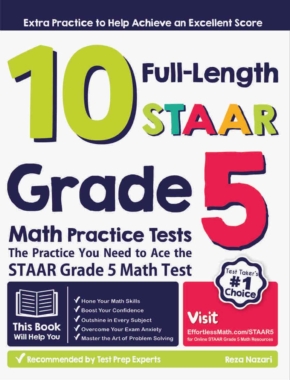
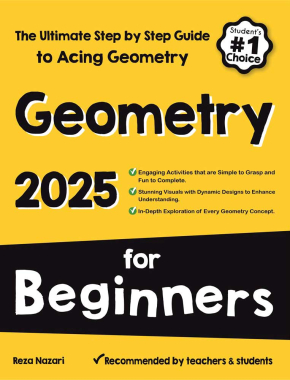
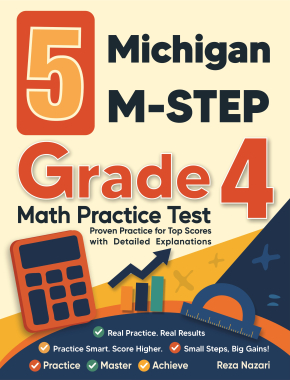
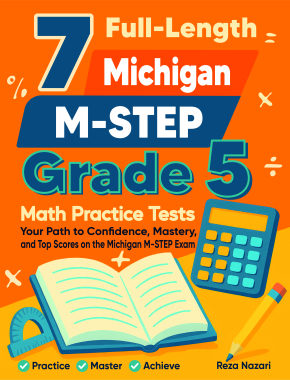
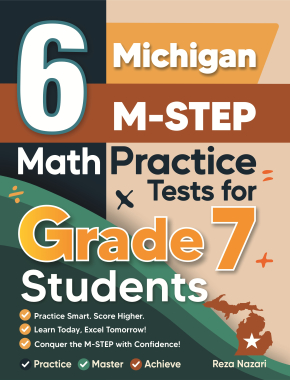
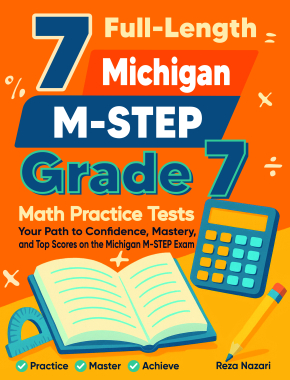
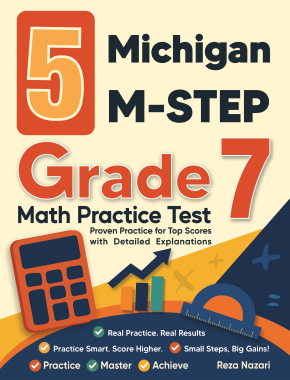
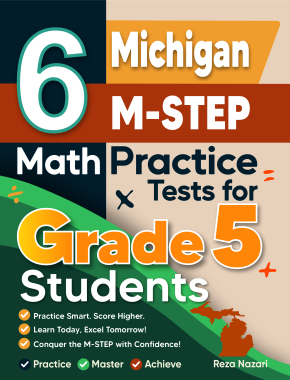
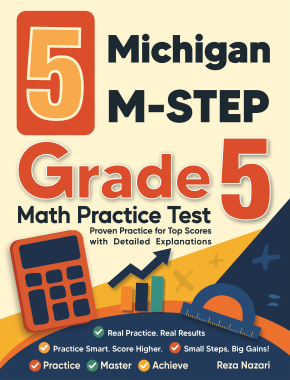
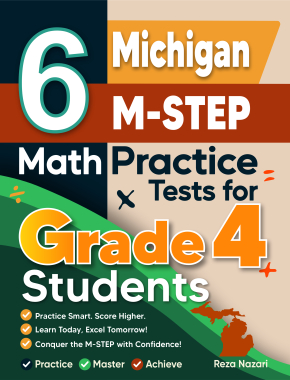
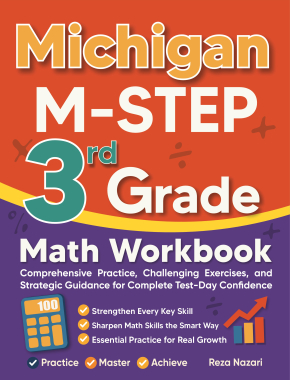
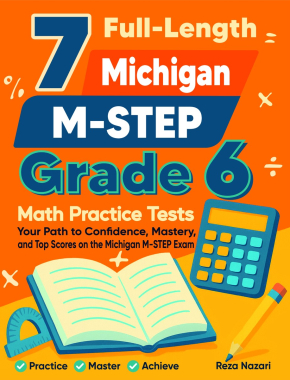
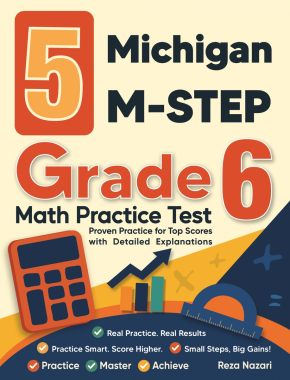
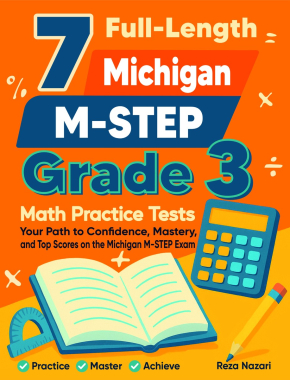
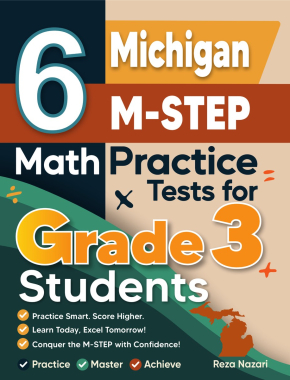
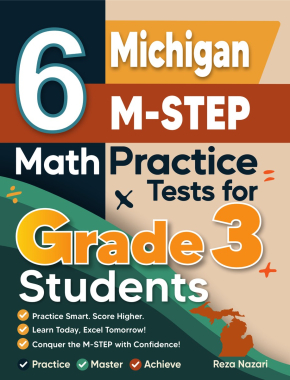
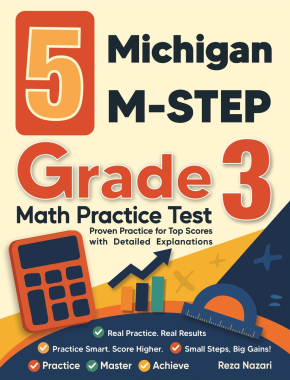









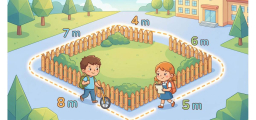

What people say about "How to Help Your 5th Grade Student Prepare for the Michigan M-STEP Math Test - Effortless Math: We Help Students Learn to LOVE Mathematics"?
No one replied yet.